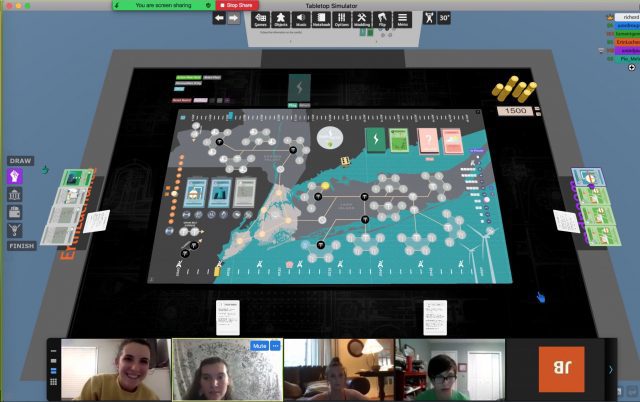“This game is literally the perfect culmination of what I’ve been teaching, to have them actually experience just how challenging decarbonization is, but also that it’s actually feasible to decarbonize, you know? It’s awesome.”
Dr. Jennifer Bradham teaches Environmental Science at Wofford College, in Spartanburg, South Carolina. Dr. Bradham first played Energetic in the Earth and Environmental Sciences program taught by Dr. Jonathan Gilligan at Vanderbilt; now she uses the game, in both tabletop and online form, in her undergraduate class at Wofford. As told to City Atlas:
Transcript:
I teach Energetic in my Earth Systems class, which is arranged around the concept of energy, including the history of the earth and how fossil fuels were produced. And then we talk about climate change and renewables.
And so this is the last lab that they do. And it makes sense, because they’ve learned all about renewables, they learned about climate change, they’ve learned about fossil fuels. We’ve talked about the Paris Agreement and the Green New Deal so they understand the push for decarbonization. Now the question for them is, how feasible is it to really do it? And what are the challenges? So instead of me talking to them about this, they actually experience it, and they get super competitive, to see who can decarbonize the quickest. It’s been a big hit.
This will be the fourth time that I’ve had a physical, in-class play of the game because it’s their lab. And I have an entire lab report that goes along with it. It’s not only their reflection of the game, but the lab has a quantitative component to it as well. For example, they will graph over time their rate of decarbonization from the game, and then compare that to the “rate of decarbonization of the US” (very basically represented as the rate of renewable energy use over time). They’re expected to reflect on what the Paris Climate Agreement suggests and also look at decarbonization rates for other countries, like China, as well as the US in order to draw broad conclusions on whether things are on track to keep warming below two degrees, whether the US is doing its part, etc. They also discuss what experiences in the game were most challenging or were most helpful to decarbonizing and then extrapolate to discuss what may be challenging for us and what’s not based on these experiences.
The coolest part for me is that some of my students who are taking this class as their Gen Ed started the semester by clearly articulating that they hate science and are only taking this class to meet Gen Ed requirements. That’s okay. Those are my favorite type of students! And some of those students were the most excited about the game, jumping up and yelling things like “Yes!! And that’s why you stabilize a grid!!” after drawing a card that would otherwise have resulted in a blackout. It’s just so cool to me to see students addressing real-world problems while having fun. I keep thinking “You told me you hated science, but here you are actively and strategically thinking about one of the most important environmental issues of our time!”
Only one team was able to decarbonize by 2035. No other team was able to do it. But actually, that’s a good thing. Because of all the data that they’re collecting, I will collect it all at the very end of the semester, and I will show all their different simulations, because they also have to say, what their priority was during game play and whether that strategy changed over time. For example, did you prioritize public opinion, or did you prioritize, you know, whatever, making solar anything like that, right. At the end of the semester, we’ll talk about how priorities might correlate with your rate of decarbonization.
But another super-interesting thing is that my school is in South Carolina, a traditionally conservative state. And I have students who are, of course, more conservative in their politics. A number of those students have told me that after this class and this simulation, they have a better understanding of why climate change is an important issue and that they’re now going home, having conversations with their families, about how climate change exists. And they’re showing them the data that we looked at in class, and they’re able to explain the data to their family.
And then they’re able to use this simulation and our experiences talking about this to show that it’s actually feasible, albeit quite challenging for a number of reasons. One group even bragged about how much money they were making by the end of the game and that they did so by passing a carbon tax and that they were able to accomplish so much after that tax. This is very cool because I’ve only introduced them to the concept of a carbon tax as a proposed strategy for decarbonization at a national level. I never discussed the pros or cons of it. They drew those conclusions on their own based on their experiences with the game.
